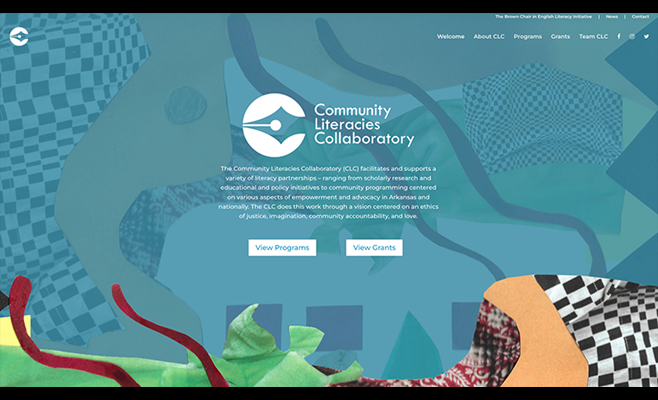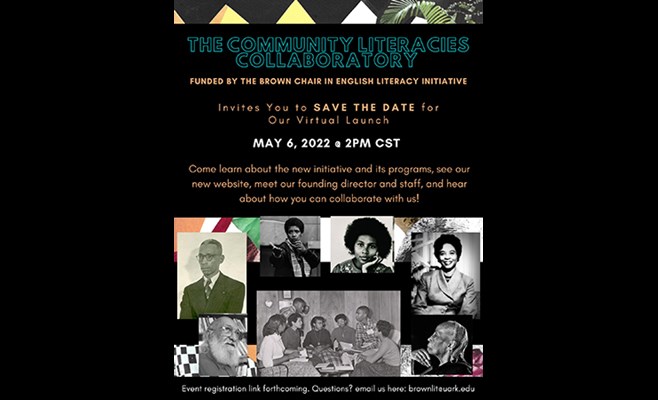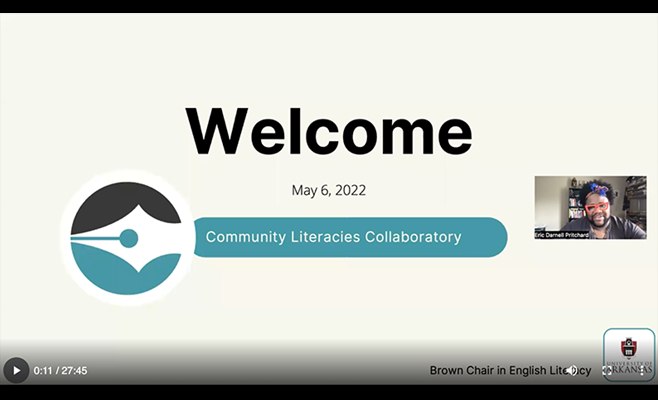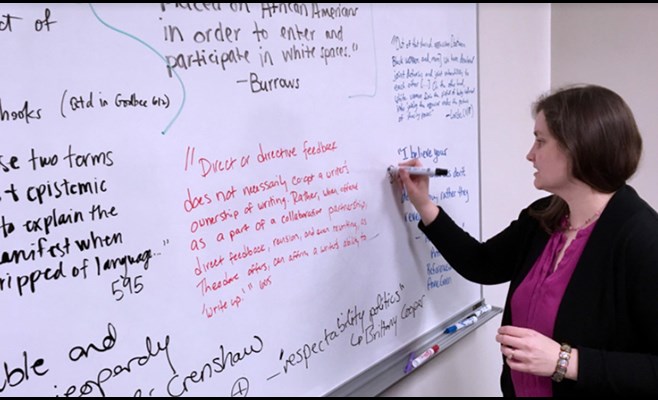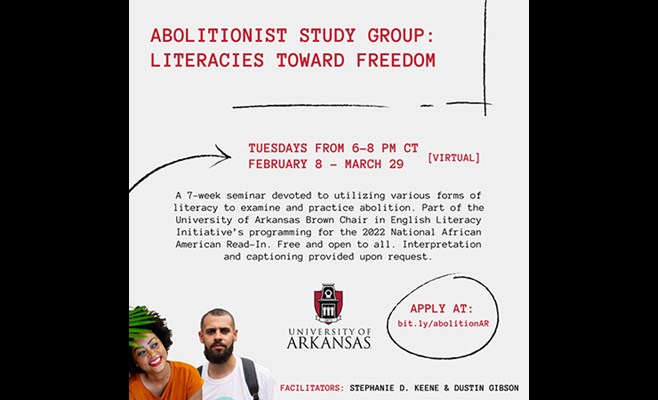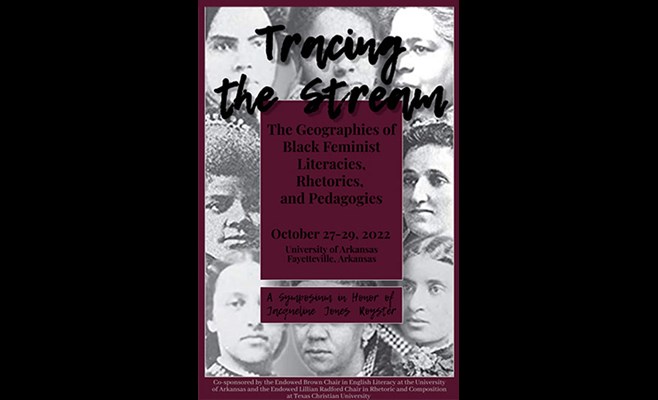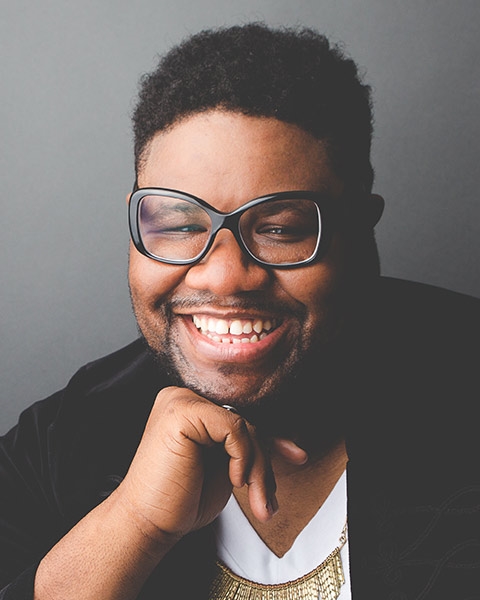The Brown Chair in English Literacy Initiative is happy to announce the launch of a new center, the Community Literacies Collaboratory, which took place on May 6. The international virtual event introduced members of the university and the public to different programs that the CLC has already begun offering and will continue to offer in the future.
The event also introduced attendees to the CLC's website, which explains the organization's mission: "The Community Literacies Collaboratory (CLC) facilitates and supports a variety of literacy partnerships — ranging from scholarly research and educational and policy initiatives to community programming centered on various aspects of empowerment and advocacy in Arkansas and nationally. The CLC does this work through a vision centered on an ethics of justice, imagination, community accountability and love."
The Community Literacies Collaboratory defines literacy as a "practice beyond reading and writing, into realms of communication using shared cultural dialects and symbols. This is shown through the clothes we wear and the diversity of community dialects that we honor and embrace." This definition allows the organization to support a broad spectrum of initiatives, consistent with inclusive, equitable and justice-oriented approaches to literacy learning, development and practices.
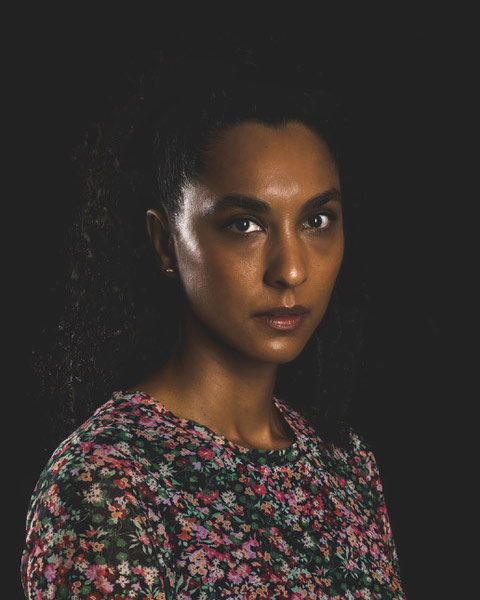 Robin Bruce |
With the assistance of web designer Adam Ritchey of InterraMedia, the CLC's website was developed by Eric Darnell Pritchard, English associate professor and the Brown Chair in English Literacy, and Robin Bruce and Jackie Chicalese, both M.F.A. students in the Program for Creative Writing and Translation as well as graduate assistants for the CLC and the Brown Chair in English Literacy.
The CLC welcomes a diversity of "literacy stakeholders — advocates, educators, researchers and creatives" — to participate in its programs, reach out for collaboration and apply for use of its resources in programs that are free and open to the public.
One of the initial programs that the CLC is hosting is The Literacy Exchange, through which community literacy facilitators can offer workshops on "literacy research methods and methodology, writing workshops and presentations on applied literacies programs, as well as trainings on incorporating various kinds of literature into K-12 classrooms, creating after-school youth literacy programs and doing adult literacy work."
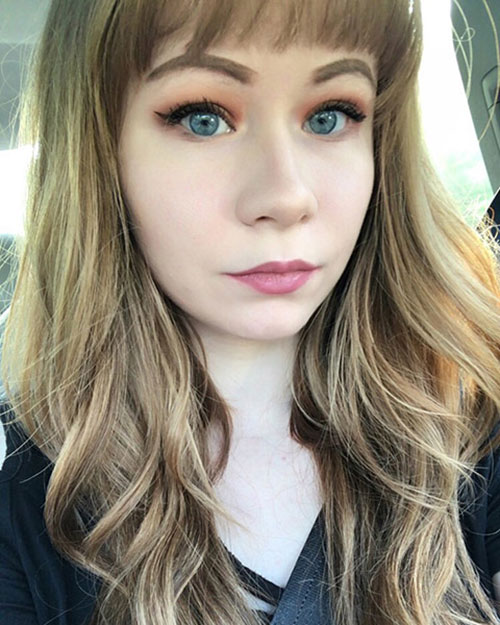 Jackie Chicalese |
The Literacy Exchange, in conjunction with the Fayetteville Public Library, has already offered two workshops, "Planning Writing Projects" and "Contemplative Writing," which were led by Beth Godbee, founder of Heart-Head-Hands: Everyday Living for Justice.
Pritchard was pleased with the turnout for the first Literacy Exchange events and is looking forward to the workshops to come. "We have already heard from Arkansans and others that our offerings over the past year have been critical to improving literacy, building community and creating space wherein participants acquired skills that have enriched their lives," Pritchard said. "The heart of any community literacies work is the people. We are elated to now have the CLC as the vessel through which we will continue this work and build even more capacity for collaboration."
Another program being offered is the Possibilities Hub, through which the Community Literacies Collaboratory funds "seminars, reading groups or a series of talks that explore a topic through and/or about literacy to expand individual and communal capacity to understand what literacy work can be and do today."
The first Possibilities Hub seminar, "Abolitionist Study Group: Literacies Toward Freedom," took place this past spring as part of the Brown Chair's programming for the 2022 National African American Read-In. Seminar participants discussed topics including the history of prisons and policing in the U.S., reform and/vs. abolition, queer and Black feminist approaches to abolition, disability justice, carceral connections between psych wards and nursing facilities, and abolition in practice.
This first seminar's success demonstrated how the Possibilities Hub can be used to encourage more in-depth dialogue on specific literacy topics.
A third CLC-sponsored program is Outside-the-Box, which "invites community literacies workers to write thought-provoking, accessible, brief policy memos, reports or essays on a timely issue within literacy learning and practice." These texts will be used to inform the public on how to develop or enhance literacy-focused activities "across a wide range of contexts." Those whose texts are accepted for publication will be compensated for their work.
The Community Literacies Collaboratory will also, on Oct. 27-29, hold its first biennial symposium, "Tracing the Stream: The Geographies of Black Feminist Literacies, Rhetorics, and Pedagogies." Co-convened with Carmen Kynard, the Lillian Radford Chair of Rhetoric and Composition and a professor of English at Texas Christian University, the symposium "will (re)consider challenging and necessary questions about what it means (or could mean) to study, teach and activate the Black feminist literacies and rhetorical tradition in 2022 and beyond."
The symposium will be held in conjunction with a graduate seminar Pritchard is offering in Fall 2022.
Finally, the CRC will be calling for grant proposals twice a year: Sept. 30 and Feb. 28. More details on how to apply will be provided on the website by the end of the summer.
Topics
Contacts
Leigh Pryor Sparks, assistant director of M.A. and Ph.D. programs
Department of English
479-575-4301,
